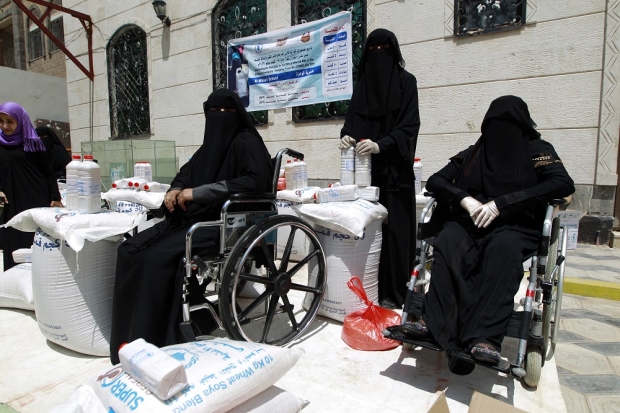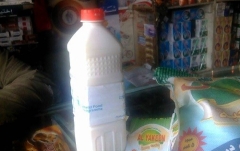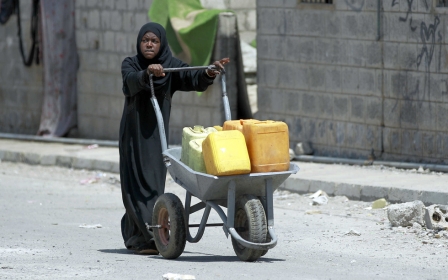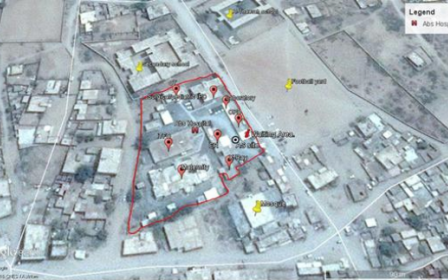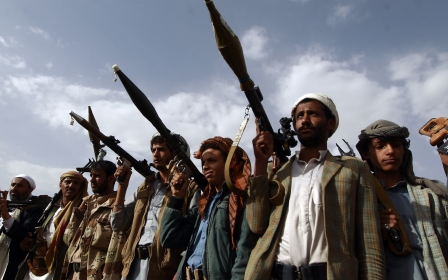Cash for aid: Yemeni shops flog humanitarian supplies for profit
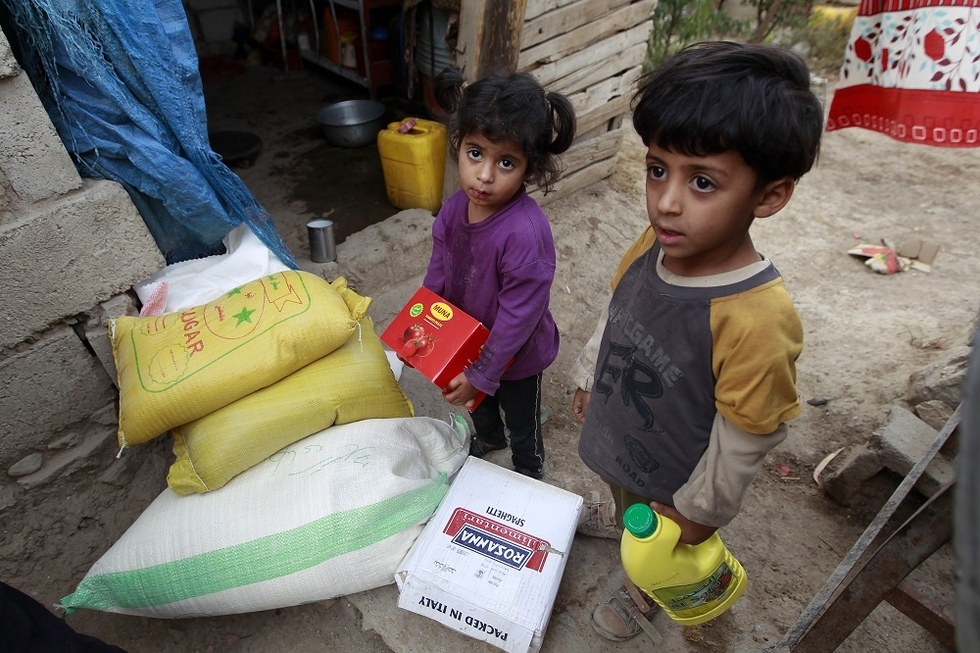
SANAA - Sitting in his bed in a tiny room in Sanaa, Abdulla al-Jaraei said that like so many other Yemenis he has seen his life and livelihood destroyed by the war.
For years, Sanaa-born Jaraei ran a successful vegetable shop in Hadramout province some 620 kilometres southeast of the capital. When he got gangrene in his leg and had to have much of it amputated in 2013, he said he got back to work the second he could so he could provide for his family.
But this July, local militants with links to al-Qaeda started clashing with troops fighting with the Saudi-led coalition that intervened in Yemen in March 2015 in an attempt to roll back Houthi militants and their allies. As a northerner, Jaraei also said he was particularly targeted by some anti-Houthi militias that would like to see south Yemen reassert independence, or at least win a great deal of autonomy from the north.
Since his return to the Houthi-held capital, however, his quality of life has swiftly deteriorated. He lives in his two-room house with his six-member family, he has no job and no other source of income, forcing him to subsist on basic food, supplies such as oil and flour, given out by aid groups.
Even this small lifeline has now come under threat. Jaraei, along with many other poor Yemenis, said that while he is grateful for the assistance, much of the aid is not going to the needy but is ending up in the hands of those who do not deserve it.
"The aid is a refuge from hunger, and the situation of the poor would be even more miserable without it,” Jaraei told Middle East Eye. “For the needy, the aid is a source of solace but I am worried this aid may stop."
Sources inside a leading relief agency confirmed to MEE that "influential” locals, be they tribal chiefs, Houthi leaders or members of people affiliated with the General People's Congress, a major political party in Yemen, were managing to get their hands on humanitarian supplies. The official said that no official figures existed but that the practice was undeniably going on.
“This [selling of aid] has been happening beyond the control of aid agencies,” the official said on condition of anonymity. “What has been sold in the market is the aid which has been taken over upon arrival by influential people. They then start distributing these items to friends, relatives or selling them to merchants."
For people like Jaraei, the misappropriation of supplies has further complicated their already difficult situation and made it even harder for them to get aid while also helping to drive up prices.
UN aid lines shop shelves
The aid can clearly be seen on display for sale in the capital’s shops, which make no effort to hide what they are doing.
Abdulwahid al-Wesabi, a shop owner in the busy district of Dar Salm, is one of the many people displaying aid for sale.
"Throughout the month, some individuals came and offered to sell food which bears the logos of UN agencies or other relief charities,” the shop owner, who is in his mid-30s, said.
“They offer these products at a low price, and I bought them and now sell them. It is business. I am not supposed to question them and ask why they are selling these items. This is not my duty.”
Wesabi said he has no immediate connections to these unidentified aid vendors but that different people periodically show up at his shop offering sugar, rice, cooking and flour for sale.
"It is tempting because we [shop owners] think about the price difference and how to increase profits," Wesabi said.
With profits hard hit by the war which broke out last year, and it extremely difficult to get supplies in and out of Yemen, many merchants admit to being tempted buy the offer to buy up aid on the cheap.
Mohammed al-Barid, the owner of a store on Taiz Street in Sanaa, said he was first approached a few months ago.
"A couple of months ago, a Hilux [Toyota pick-up] vehicle stopped in front of my shop, carrying eight sacks of flour, several bags of rice and sugar and a carton of biscuit,” he said.
“All these products had the UN logo on them. The men in the car offered the items for sale. We negotiated on the price and made the deal. Then I sold them as normal.”
According to Barid, the sellers refused to tell him who they were, presumably out of fear of retribution from local strongmen who are believed to be behind the scheme.
"Personally, I am a merchant, and I buy and sell what gives me revenue,” Barid said. “I cannot force these unknown sellers to disclose their identity."
"Some give me sugar, flour or rice, and I in turn give them eggs, vegetables, chicken or chocolate," he said.
"In such a situation, I do not even raise my eyebrows. I am only dubious about sellers who have large quantities of the product and insist on being paid in cash."
Yemen, for some decades one of the poorest countries in the Middle East, has been devastated by years of political turbulence that broke out following protests inspired by the Arab Spring in 2011. In September 2014, Houthi rebels, who traditionally live in the north of the country, brought the capital to a halt and forced major concessions from President Abd Rabbuh Mansour Hadi.
In January 2015, the Houthis went further and disbanded parliament and placed Hadi under house arrest. The following month, he escaped and fled to Saudi Arabia. In March 2015, Riyadh decided to intervene and formed a largely Arab military coalition that began carrying out air strikes and also sent in some ground troops to roll back the Houthis and their allies. Since then, parts of the south have been recaptured but the capital remains in Houthi control. More than 6,000 people have been killed, largely in air strikes.
In May this year, UNICEF said 21 million people were in need of urgent humanitarian aid, with 300,000 children under the age of five at risk of severe malnutrition. A recent investigation by the BBC found that some children were already starving to death.
According to the IMO source, some of the aid goes to internally displaced people living in camps, or makeshift accommodation such as schools. The rest is handed out in coordination with the Social Fund for Development, a government body established in 1997 to fight poverty. Those people in rural or hard-to-reach areas have often found it the hardest to cope.
Quarrel over aid
Local disputes have also led to aid being frozen. Mohammed Hafdalla, an aid beneficiary in the Ibb province in central Yemen, said that since aid deliveries stopped he has not been able to support his wife and five kids.
As the only breadwinner in the family, he used to receive food aid from a local charity, but this stopped after a quarrel about distribution.
"I was getting aid every three months. This blessing stopped after a serious disagreement erupted between some Houthi militants and the charity officers. Finally, the charity stopped distributing aid. I have not received aid since,” Hafdhalla told MEE by phone.
With food insecurity growing and prices of staples rising, he said he has little hope that his situation will improve. According to the UN’s Food and Agriculture Organization, domestic prices of wheat were “12-15 percent higher in May 2016 compared with pre-crisis levels, even though global wheat prices have decreased in recent months”.
The sense of hopelessness is echoed in the capital.
"Aid is not sufficient. It should be increased or distributed properly,” Jaraei said. “We also have no water or electricity. I feel the future of my family is lost.”
This article is available in French on Middle East Eye French edition.
New MEE newsletter: Jerusalem Dispatch
Sign up to get the latest insights and analysis on Israel-Palestine, alongside Turkey Unpacked and other MEE newsletters
Middle East Eye delivers independent and unrivalled coverage and analysis of the Middle East, North Africa and beyond. To learn more about republishing this content and the associated fees, please fill out this form. More about MEE can be found here.


